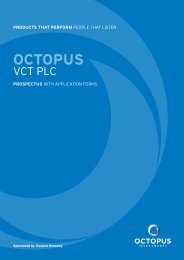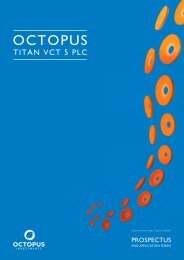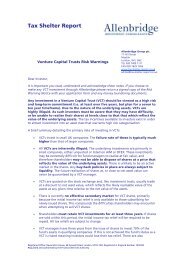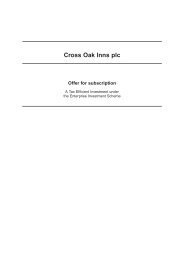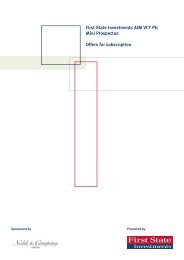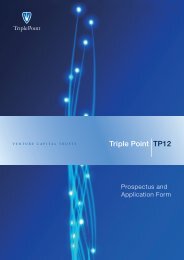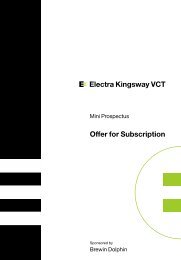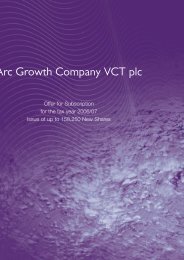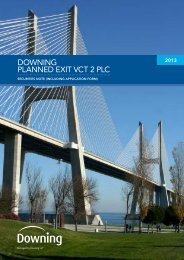EDGE_G_4 12-59-34_Layout 1 - The Tax Shelter Report
EDGE_G_4 12-59-34_Layout 1 - The Tax Shelter Report
EDGE_G_4 12-59-34_Layout 1 - The Tax Shelter Report
Create successful ePaper yourself
Turn your PDF publications into a flip-book with our unique Google optimized e-Paper software.
32 Edge Performance VCT plc<br />
(c)<br />
Loans<br />
VCT reliefs may not be available if the investor takes out a loan specifically to subscribe in the VCT.<br />
5. Consequences of loss of VCT status<br />
(a)<br />
(b)<br />
(c)<br />
For the VCT<br />
<strong>The</strong> exemption from corporation tax on capital gains will not apply to any gain realised after the time from<br />
which VCT status is lost. Where provisional approval is lost, all gains realised over the period during which<br />
provisional approval was in force will be subject to corporation tax. Should tax status be lost under Section<br />
274 of ITA the FSA will be notified as soon as possible and an announcement would be made using an<br />
approved regulatory information service provider.<br />
For Qualifying Subscribers<br />
If VCT approval is treated as never having been given, or if it is withdrawn before the shares have been held<br />
for five years, the relief will be withdrawn by the making of an assessment for the year of assessment for<br />
which the relief was originally given on an amount equal to that relief. Interest on overdue tax may arise.<br />
For Qualifying Subscribers and Qualifying Purchasers<br />
(i) Dividend income<br />
Dividend income will not be exempt from tax in respect of profits or gains arising or accruing in any<br />
accounting period at a time when VCT status has been lost. A notional tax credit equal to 1/9th of the<br />
net dividend paid will be available to offset against income tax due on the dividend.<br />
(ii) Capital gains<br />
If provisional VCT approval is withdrawn, approval is treated as never having been given. Gains and losses<br />
on shares in the VCT will be taxable and allowable in the ordinary way. If full VCT approval is withdrawn,<br />
the individual is treated as having disposed of his shares immediately before the status is lost, for market<br />
value at that time, and is treated as reacquiring them at that value immediately after the status is lost.<br />
Thus, any capital gains realised up to that date will be exempt from tax, but gains after that date will be<br />
taxable in the ordinary way.<br />
I:9.2.3<br />
(B)<br />
THE COMPANY<br />
<strong>The</strong> following is a general guide to the tax position of a VCT. This summary is not intended to be comprehensive and<br />
prospective investors are advised to seek their own independent professional advice.<br />
1. Qualifying as a VCT<br />
A VCT must not be a close company and must be approved as a VCT by HMRC. <strong>The</strong> main conditions for approval<br />
are that throughout its most recent complete accounting period:<br />
(a) the company’s income has been derived wholly or mainly from shares or securities (including loans to companies<br />
with a five year or greater maturity period);<br />
(b) at least 70% by value of its investments are represented by shares or securities in “Qualifying Holdings” (see<br />
2 below), of which at least 30% by value are represented by holdings of ordinary shares carrying no preferential<br />
rights (although in the case of investments made from funds raised by a VCT after a date to be introduced by<br />
the Finance (No. 3) Act 2010, the requirement will be that at least 70% by value will be represented by<br />
holdings of “eligible shares”, which will include certain forms of preference share). Additionally at least 10%<br />
by value of investments in single companies or groups must be in ordinary shares which carry no preferential<br />
rights;<br />
(c) not more than 15% by value of its investments has been held in a single company or group (other than a VCT)<br />
and the VCT must not control the companies in which it invests in such a way as to render them subsidiary<br />
undertakings;<br />
(d) it has not retained more than 15% of the income derived in that period from shares and securities;<br />
(e) each class of its ordinary share capital has been quoted on the London Stock Exchange.




